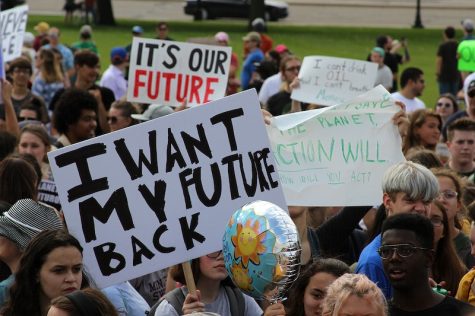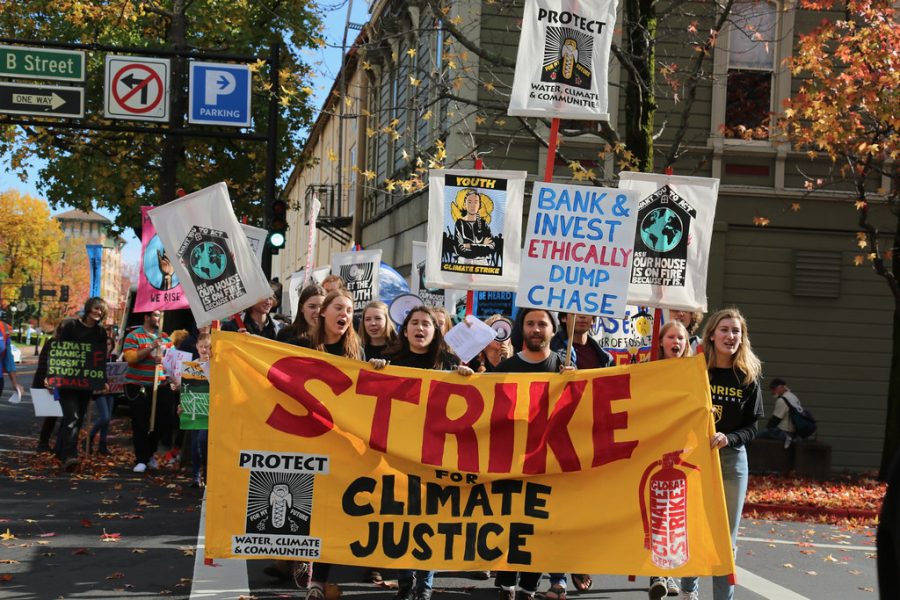Eco-anxiety is essential to saving our planet
Eco-anxiety, the extreme worry of current or future harms to the environment, can inspire younger generations to take action against climate change
March 2, 2023
Whenever environmental issues are discussed in the news, many become concerned about catastrophic damage being done to our environment.
Yet, those watching at home often are too young to vote and sometimes feel too young to take action and are left with a feeling of extreme hopelessness.
A nationally representative EdWeek Research Center survey found that 37% of teenagers feel anxious about climate change and its effects, and more than a third feel afraid.
In a Washington Post-Kaiser Family Foundation poll of American teenagers, 57% said that climate change made them feel scared, and 52% said it made them angry, both at higher rates than among adults.
This phenomenon was finally given a name in 2017 by The American Psychological Association. The APA defines“eco-anxiety” as “a chronic fear of environmental doom.”
According to a study done by Navjot Bhullar, a professor of psychology at Edith Cowan University, it was discovered that children and young people are identified as the most vulnerable to climate anxiety, otherwise known as eco-anxiety.
For example, I’ll read an article about some environmental issues: Global Warming From Fossil Fuels, Sea Level Rise, Deforestation, Plastic Pollution, etc., and then I become overwhelmed with hopelessness and click off because the article upsets me.

I always convince myself that I am harming my mental health by tuning in to see what improvements, or damages, have been made to our climate crisis. I’m not alone in this opinion.
The American Academy of Pediatrics issued a policy statement in 2015 warning that climate change threatens “children’s mental and physical health.”
The ones who are too young to be in power are the ones with the most concern about climate change. Yet, the ones in power actually making decisions are the ones who don’t care about climate change enough.
Eco-anxiety isn’t the only negative result of the growing doomsday tone surrounding climate news. Emerging evidence suggests poor air quality can negatively impact mental health, particularly depression, and anxiety. Poorer air quality has been a significant result of climate change.
Suppose other teens like me are averting environmental news because of its gloomy, unsettling tone. How will our massive environmental issues ever be solved?
This issue is a double-edged sword. Professor Lorraine Whitmarsh’s research, a professor of environmental psychology at the University of Bath, concluded that climate anxiety is not harmful and motivates people to act and help save the environment. So maybe it isn’t so bad that adverse reporting of climate change is skyrocketing.
Newspaper coverage of environmental issues in Oct. 2021 has more than doubled (a 114% increase) from Oct. 2020. Newspaper coverage increased by 22%, and radio up 29% from Sep. While newspaper coverage stabilized in Nov. 2021, it had increased 81% from a year prior, and global radio coverage of climate change increased by 45% from Oct. to Nov. 2021.
As it turns out, the general public consumes more negative than positive news. For instance, magazine sales increase roughly 30% when the cover is negative rather than positive.
Suppose media consumers are more willing to tune into what is happening in the world regarding the environment when it is negative. In that case, newspaper and magazine companies must keep focusing on the negatives our world is doing ecologically; it is the only way to save our struggling planet.
Since Generation Z has been placed with the burden of saving the planet that was destroyed by generations before them, it is natural that they feel obligated to take steps in the right direction for the sake of the environment.
Eco-anxiety has made younger generations more aware and, as a result, more likely to take action against environmental issues.
73% of Gen Z consumers say they are willing to pay more for sustainable products, which is more than any other generation.
I believe that we have hope for the future. My generation is so much more educated on environmental issues than previous generations. This eco-anxiety will catapult Gen Z to make needed changes to save our planet.







